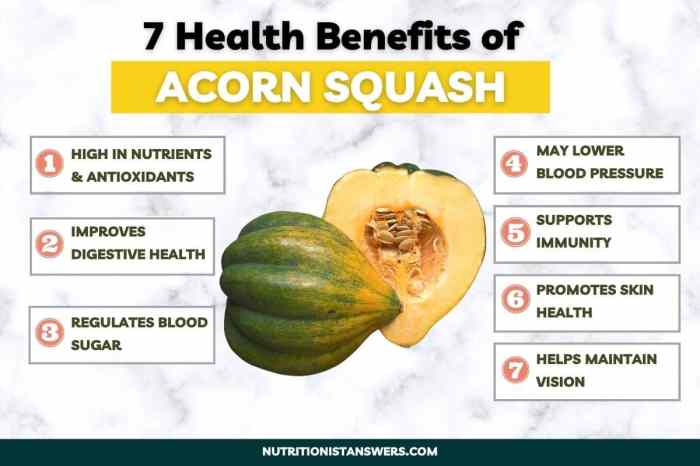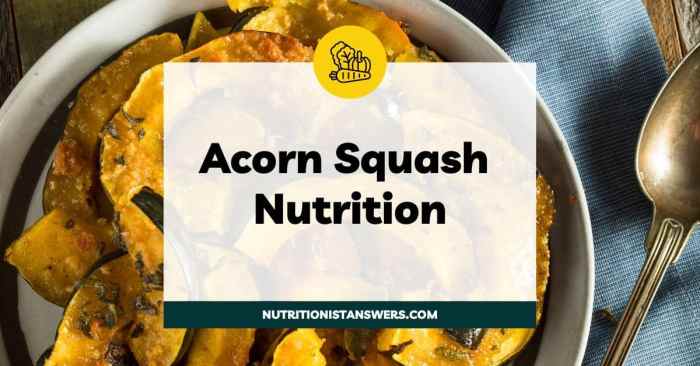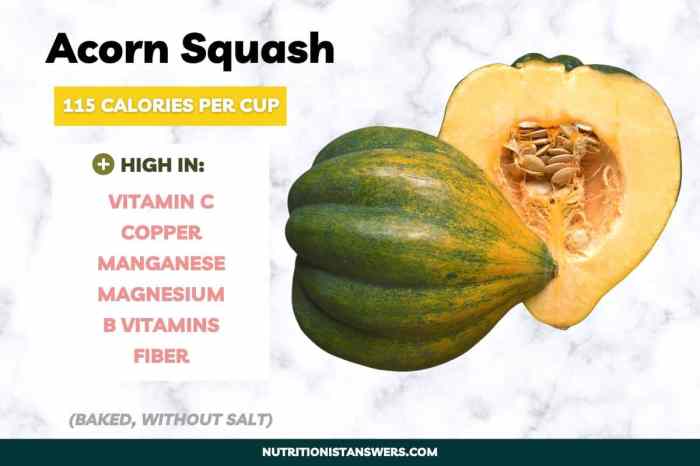Acorn Squash Nutritional Profile

Acorn squash nutrition facts – Acorn squash, with its distinctive shape and sweet flavor, is a nutritious addition to any diet. This section delves into the detailed nutritional composition of acorn squash, comparing it to other popular winter squashes, and highlighting the health benefits derived from its key nutrients.
Acorn Squash Nutritional Breakdown per 100g
The following table provides a comprehensive nutritional breakdown of acorn squash per 100g serving. Note that nutritional values can vary slightly depending on factors such as growing conditions and preparation methods.
| Nutrient | Amount (per 100g) | Nutrient | Amount (per 100g) |
|---|---|---|---|
| Calories | 60-70 | Vitamin C | 20-25 mg |
| Carbohydrates | 15-17g | Vitamin K | 3-5 µg |
| Protein | 1-2g | Potassium | 300-400 mg |
| Fat | 0.5-1g | Manganese | 0.3-0.5 mg |
| Fiber | 3-4g | Vitamin B6 | 0.2-0.3 mg |
| Vitamin A | 200-300 IU | Magnesium | 20-30 mg |
Comparison with Other Winter Squashes
Acorn squash shares many nutritional similarities with other winter squashes, but also possesses some unique characteristics. Understanding these differences can help in making informed dietary choices.
Below is a comparison of acorn squash’s nutritional profile to that of butternut squash and kabocha squash. These values are approximate and can vary based on factors such as cultivar and growing conditions.
- Acorn Squash: Relatively high in Vitamin C and fiber, moderate in Vitamin A and potassium.
- Butternut Squash: Known for its high beta-carotene content (which converts to Vitamin A), also a good source of potassium and fiber.
- Kabocha Squash: Rich in Vitamin A and various antioxidants, contains a good amount of fiber and potassium, similar to butternut squash.
Health Benefits of Key Nutrients in Acorn Squash, Acorn squash nutrition facts
The vitamins, minerals, and fiber in acorn squash contribute to various health benefits.
The high fiber content aids in digestion and promotes regularity, contributing to gut health. Vitamin C acts as a powerful antioxidant, supporting the immune system. Vitamin A is crucial for vision and maintaining healthy skin. Potassium plays a vital role in regulating blood pressure. Manganese supports bone health and metabolism.
The combination of these nutrients makes acorn squash a valuable addition to a balanced diet.
Acorn Squash in a Balanced Diet: Acorn Squash Nutrition Facts

Acorn squash is a remarkably versatile vegetable that seamlessly integrates into a variety of dietary approaches, offering nutritional benefits alongside culinary flexibility. Its naturally sweet flavor and dense texture make it a welcome addition to both sweet and savory dishes, catering to diverse palates and dietary needs. This adaptability makes it a valuable component of balanced, vegetarian, and vegan meal plans.Acorn squash’s nutritional profile, rich in fiber, vitamins, and minerals, supports overall health and well-being.
Its incorporation into different meal plans enhances their nutritional value, contributing to a more complete and balanced intake of essential nutrients.
Acorn Squash in Vegetarian and Vegan Diets
Acorn squash provides a hearty and nutritious base for many vegetarian and vegan dishes. Its naturally sweet flavor complements other vegetables and legumes, creating satisfying and flavorful meals. The squash’s versatility allows it to be used as a main course, side dish, or ingredient in soups, stews, and salads. Its high fiber content contributes to satiety, making it an ideal choice for maintaining a feeling of fullness.
- Stuffed Acorn Squash with Quinoa and Black Beans: A hearty and flavorful vegan main course featuring quinoa and black beans filling a roasted acorn squash half. The vibrant colors and textures create a visually appealing and nutritious meal. Imagine the deep orange of the squash contrasting with the dark beans and fluffy quinoa.
- Roasted Acorn Squash with Maple-Glazed Brussels Sprouts: A delicious vegetarian side dish showcasing the complementary flavors of roasted acorn squash and maple-glazed Brussels sprouts. The sweetness of the maple glaze balances the earthiness of the squash and sprouts, creating a harmonious flavor profile. Picture the glistening sprouts alongside the tender, caramelized squash.
- Acorn Squash and Lentil Soup: A warming and comforting vegan soup featuring acorn squash, lentils, and aromatic vegetables. The soup’s creamy texture and rich flavor make it a satisfying and nutritious meal, perfect for cooler weather. Envision the vibrant orange hue of the soup, punctuated by the earthy lentils.
Acorn Squash in Balanced Diets
Incorporating acorn squash into a balanced diet enhances the overall nutritional value of meals. Its fiber content aids digestion and promotes regularity, while its vitamin and mineral content supports various bodily functions. The squash’s relatively low calorie count and high fiber content contribute to a feeling of fullness, making it a beneficial addition to weight management strategies.
Acorn squash offers a good source of fiber and vitamins, contributing to a balanced diet. However, if you’re looking for a quick electrolyte boost after a workout, you might consider checking out the liquid iv nutrition facts to see how it compares in terms of sodium and potassium content. Returning to acorn squash, its nutritional profile also includes beneficial antioxidants, making it a versatile and nutritious vegetable.
Acorn Squash in Weight Management
The high fiber content of acorn squash contributes significantly to weight management efforts. Fiber promotes satiety, helping individuals feel fuller for longer periods, thus reducing overall calorie intake. Furthermore, the low calorie density of acorn squash allows for larger portion sizes without a significant increase in caloric intake. This makes it an excellent choice for those seeking to maintain or lose weight while still enjoying a satisfying and nutritious diet.
Studies have shown that diets rich in fiber are associated with better weight management outcomes, and acorn squash’s contribution to fiber intake can be a valuable component of a successful weight management plan. For example, replacing high-calorie, low-fiber snacks with a portion of roasted acorn squash can significantly reduce overall daily calorie intake and increase satiety.
Visual Representation of Acorn Squash Nutrition

A compelling visual representation can effectively communicate the nutritional benefits of acorn squash. By using color, shape, and size to represent different nutrients, we can create easily digestible infographics that highlight its nutritional value. Two key visuals are presented below: one focusing on individual nutrients, and another demonstrating its place within a balanced meal.
Acorn Squash Nutrient Composition
This visual would be a circle graph, approximately 6 inches in diameter. The largest segment, perhaps 40% of the circle, would be a deep orange to represent beta-carotene (a precursor to Vitamin A). A smaller, adjacent segment, approximately 25% of the circle, would be a vibrant green to represent Vitamin C. A smaller segment, about 15%, would be a light brown to symbolize fiber.
Smaller segments would represent potassium (a light purple), vitamin B6 (a light yellow), and manganese (a dark grey). Each segment would be clearly labeled with the nutrient name and a percentage representing its approximate contribution to the overall nutritional profile of a single serving of cooked acorn squash. The circle would be set against a background of a muted beige to represent the squash’s natural color.
Acorn Squash in a Balanced Plate
This visual would depict a standard 9-inch dinner plate divided into three sections: one-half for non-starchy vegetables, one-quarter for a lean protein source, and one-quarter for a whole grain or starch. The non-starchy vegetable section would prominently feature a wedge of acorn squash, roughly 1 cup cooked, taking up a significant portion of that half of the plate.
The color of the squash would be a realistic autumnal orange-brown. The protein section could show 3-4 ounces of grilled chicken breast or fish. The grain section could include a half-cup of cooked quinoa or brown rice. All food items would be realistically drawn and appropriately sized to reflect recommended serving sizes. The entire plate would be placed on a simple white background for clarity.
This visual emphasizes the role of acorn squash as a substantial and healthy component of a balanced and nutritious meal.
Q&A
What are the best ways to store acorn squash?
Store acorn squash in a cool, dry, and well-ventilated area. A dark pantry or basement is ideal. Avoid refrigeration unless it’s already cut; cut squash should be refrigerated and used within a few days.
Is acorn squash suitable for people with diabetes?
While acorn squash is relatively low on the glycemic index, individuals with diabetes should still consume it in moderation and monitor their blood sugar levels. The fiber content helps regulate blood sugar, but portion control remains important.
Can I freeze acorn squash?
Yes, you can freeze acorn squash. Roast or steam it first, then cool completely before storing in freezer-safe containers or bags. Frozen acorn squash can last for several months.
Are there any potential allergens in acorn squash?
Acorn squash itself is generally not considered a common allergen. However, always check for cross-contamination if you have severe allergies, especially if prepared in a facility that handles other allergenic foods.
